

What is happening in a teenage brain? Understanding the Teen Brain. “She’s a teenager, what do you expect?”

Why do adults say things like that? Is there something wrong with teenagers? What exactly is going on in the teenage brain? Between puberty and adulthood, people change dramatically. During this time, children mature and develop their own identity. Growing up is a difficult process. How do scientists study the brain? Not long ago, the human brain was hard to study. However, things began to change in the 1990s. What goes on in the teenage brain? The human brain is made up of many interconnected parts. During childhood, each part of your brain is more focused on developing than on communicating with other parts.
What changes in the teenage brain help this communication system? Did you know? However, your brain also has an unmyelinated portion. Don’t worry, the teenage brain is not getting rid of important material. How does the teenage brain affect behaviour? The different parts of the brain don’t all get upgraded at the same time. The Teenage Brain Explained. TED: How to parent a teen from a teen’s perspective? Teen's brain upgrading in progress: Operant Conditioning from Parents' Perspective. Reinforcement & punishment from a parents perspective. Operant Conditioning (Punishment and Reward theory) - Psychology. Operant Conditioning in Parenting. Positive Reinforcement for Teen. The value of reinforcing positive behaviour for our teens.
As children approach adolescence, they sometimes begin testing limits, bending the rules and otherwise going against the grain.
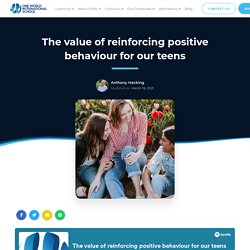
While this is normal behaviour for teens, it can be incredibly trying for you, as a parent. Teenagers may also be dealing with the stresses that come with trying to fit in with their peers and assert their growing independence. However, at the same time, they are looking for validation from the adults around them. It's crucial, therefore, for parents and teachers to provide as much guidance and positive reinforcement as possible, rather than simply tightening the rules. While it may be challenging to reward and praise a teen, who may appear to be indifferent to us, it's well worth the effort. Benefits of Positive Reinforcement for Teens Although they probably won't admit it, teens crave approval from trusted adults in their world. Positive Consequences. Positive and Negative Consequences. When most parents think about consequences for kids, they usually envision negative consequences, like a time-out or taking away a video game.
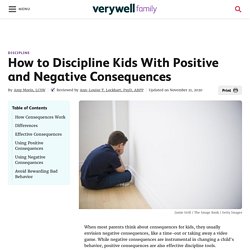
While negative consequences are instrumental in changing a child's behavior, positive consequences are also effective discipline tools. When used together, positive and negative consequences will change your child's behavior1 —as long as they are used consistently. Use positive consequences to reinforce good behavior and enforce negative consequences to discourage bad behavior. What is Negative Reinforcement? Why Negative Reinforcement Works Better as Your Child Grows into A Teen. If you are someone who has always loved the freedom of “no strings attached”, the idea of marrying and having kids could be quite underwhelming.
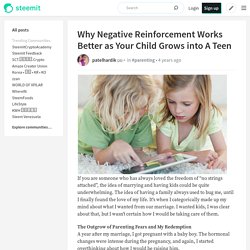
The idea of having a family always used to bug me, until I finally found the love of my life. It's when I categorically made up my mind about what I wanted from our marriage. I wanted kids, I was clear about that, but I wasn’t certain how I would be taking care of them. The Outgrow of Parenting Fears and My Redemption A year after my marriage, I got pregnant with a baby boy. The hormonal changes were intense during the pregnancy, and again, I started overthinking about how I would be raising him. When I was in the 24th month of my pregnancy, I started staying emotionally distressed about how I would be dealing with my toddler's late night tantrum and smelly diapers (honestly, I don't feel the same now), or his aggression when he'll grow into a preteen.
Negative Reinforcement Vs. What is Positive Punishment? Positive Punishment: What It Is, Benefits, and Examples. Positive punishment is a form of behavior modification.
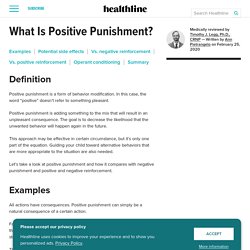
In this case, the word “positive” doesn’t refer to something pleasant. Positive punishment is adding something to the mix that will result in an unpleasant consequence. The goal is to decrease the likelihood that the unwanted behavior will happen again in the future. This approach may be effective in certain circumstance, but it’s only one part of the equation.
Guiding your child toward alternative behaviors that are more appropriate to the situation are also needed. Negative Punishment Examples and Scenarios. Nobody ever wants their stuff taken away.
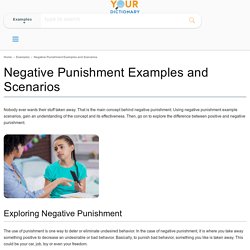
That is the main concept behind negative punishment. Using negative punishment example scenarios, gain an understanding of the concept and its effectiveness. Then, go on to explore the difference between positive and negative punishment. Exploring Negative Punishment The use of punishment is one way to deter or eliminate undesired behavior. When thinking of negative punishment, you might think of B.F. Negative Punishment Drawbacks – Tired Mom Supermom. Negative Punishment Drawbacks Inside this post: The drawbacks of using negative punishment when disciplining children.

It’s shocking how many adults still use negative punishment with their kids today. I see comments such as “just give them a spank, that’ll stop the whining” in response to my how to stop whining in children article, which uses positive parenting to solve the whining issue. It makes me SO SAD to see this, and I thought maybe the problem is the lack of education on the subject of negative punishment, So please sit back, relax, and enjoy this explanation of what negative punishment is, examples of it, and how to use positive discipline with your kids instead. *This post may contain affiliate links. The Study of Punishment in Psychology. Punishment is a term used in operant conditioning to refer to any change that occurs after a behavior that reduces the likelihood that that behavior will occur again in the future.
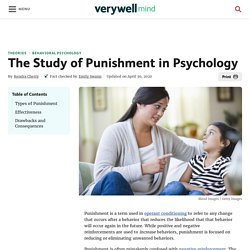
While positive and negative reinforcements are used to increase behaviors, punishment is focused on reducing or eliminating unwanted behaviors. Punishment is often mistakenly confused with negative reinforcement. The difference: Reinforcement increases the chances that a behavior will occur and punishment decreases the chances that a behavior will occur. 12 Examples of Positive Punishment & Negative Reinforcement.
You might be thinking that “positive punishment” sounds like an oxymoron, after all, how can punishment be positive?
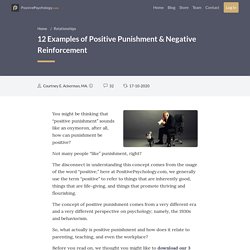
Not many people “like” punishment, right? The disconnect in understanding this concept comes from the usage of the word “positive;” here at PositivePsychology.com, we generally use the term “positive” to refer to things that are inherently good, things that are life-giving, and things that promote thriving and flourishing. The concept of positive punishment comes from a very different era and a very different perspective on psychology; namely, the 1930s and behaviorism. A New Definition of Punishment. Example of discipline strategies. The Difference Between Punishment and Discipline. Discipline for Teens: Strategies and Challenges. When your child becomes a teenager, your parenting role is likely to shift.
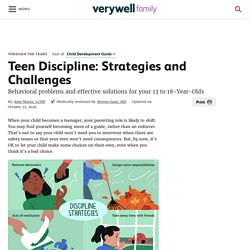
You may find yourself becoming more of a guide, rather than an enforcer. That’s not to say your child won’t need you to intervene when there are safety issues or that your teen won’t need consequences. But, by now, it’s OK to let your child make some choices on their own, even when you think it’s a bad choice. Typical Teen Behavior Teens like to test the limits of their independence.1 So don’t be surprised when your teen argues with you when you say no, or when they go behind your back to do as they please. Adolescence can be a tumultuous time for teens as they change physically, emotionally, and socially. Meanwhile, as friends and romantic relationships grow increasingly important, your teen will want to spend more time with their peers. Your teen also will want more privacy. Discipline strategies for teenagers.
Teenage discipline: the basics Discipline isn’t about punishment. It’s about teaching children appropriate ways to behave. The Benefits of Discipline. Howard Advising parents 1996. 8 Lessons You Should Avoid Teaching Children. 10 Things You Should Never Say to Teens. 14 Subtle Things Abusive Parents Do. Positive Parenting Strategies For The Teenage Years. Positive Reinforcement - Tips for teaching and parenting.